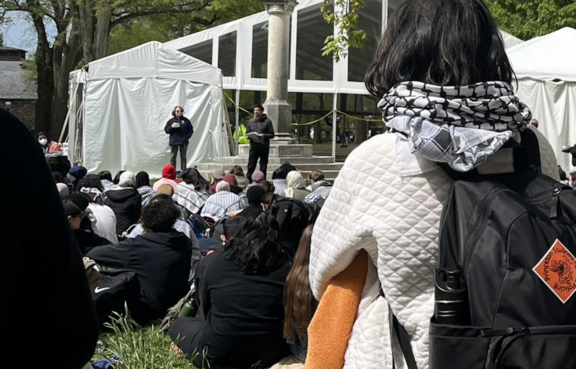On Monday, April 29, thirteen undergraduate students and one professor occupied Clio Hall on the campus of Princeton University in an attempt to force the administration to meet their demands for a revision of university relations with the state of Israel. The students asked for: full disclosure of the university investment portfolio concerning Israel; financial divestment from a specific list of companies; academic boycott of Israeli academic institutions, but not individuals; purposeful partnership with Palestinian universities without requiring an Israeli institution to be involved in order to achieve “balance”; and an immediate and permanent ceasefire in Gaza and throughout Palestine/Israel. As of the time of this writing, the university has still refused to even meet with students let alone hear and discuss their demands.
While Clio Hall was occupied, many other faculty stood on the back steps of Clio Hall and read aloud the students’ demands, amplifying their message. Then, I introduced and read a poem by the late Palestinian poet Dr. Refaat Alareer, who was murdered by the Israeli Occupation Forces on December 6, 2023. I had already read this poem on campus days before, on Thursday, April 25, when the Princeton Popular University for Gaza was inaugurated on the McCosh lawn, which became the site of the Princeton encampment—an encampment, however, without tents, because President Christopher Eisgruber and other bureaucratic administrators cynically deployed the concept of “time, place, and manner” in order to invalidate the tactics and demands of the student activists.
That day, April 25, also happened to be the last lecture of my undergraduate course History of Palestine/Israel. At the start of that meeting, I informed my students that I would be walking out of class in order to teach at the Popular University of Gaza, clearly informing the students that they were by no means obliged to attend the lecture on the lawn and that there would be no penalties for anyone who chose not to join, for whatever reason. After providing a summary of what we had covered in the course, and my thoughts on how what we learned in the course—a chronological survey of the history of Palestine, Zionism, and the Arab-Israeli Conflict from the late-nineteenth century to the present—was not only germane but deeply and meaningfully connected to what was then happening on campus and around the world, I closed my remarks by reading Alareer’s poem.
The introductory remarks I gave before reading the poem included my explanation and framing of the literary context required for adequately and appropriately understanding the work. The overarching message was quite simple and straightforward, presented under the sign of one lesson with two subsidiary precepts.
Below are my remarks, lightly edited for clarity.
Lesson: Reading Is an Important Skill
Precept #1: Commas Are Political
On Thursday, a reporter from the New York Post spoke with me after my lecture and later co-wrote a piece claiming that I “read a poem from a Palestinian writer” without naming Refaat Alareer. Say his name. Refaat Alareer. Say his name. Refaat Alareer. Say his name. Refaat Alareer. The Post reported that the poem, “says that Jews ‘evolved backward.’”
A Princeton student is quoted in an April 27 Fox News piece as saying the following: “In that poem [he] said, the Jews have ‘evolved backwards.’ Evolved backwards. And if that’s not antisemitic, if that isn’t in violation of policies regarding discrimination, I don’t know what is.”
The brackets are in the article, and it is unclear to me whether the speaker is mistakenly referring to me as the author or referring to Refaat Alareer.
Once again, I am not reading my poem, but a poem by Refaat Alareer. Say his name. Refaat Alareer.
The relevant line from the poem, “I Am You,” reads as follows:
The victim has evolved, backward,
Into a victimizer.
It would be worthwhile for any reader to pay close attention to this line in order to determine how it functions in the poem.
Precept #2: Pronouns Matter
The first-person singular narrator communicating the poem only ever refers to indefinite pronouns—You and I—and never to a proper name, ethnicity, religion, or nationality. I believe this is crucial for understanding the poem and our current moment. Those who wish to find Jews and Palestinians and Arabs and Muslims in the poem will have to rely upon their own pre-conceived notions and projected political agendas.
My reading was dedicated to Refaat Alareer and to Rachel Corrie—fearless, peace-loving, eternal.


